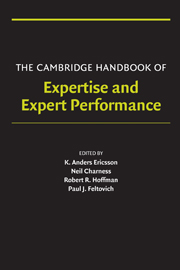Book contents
- Frontmatter
- Contents
- Acknowledgments
- Contributors
- PART I INTRODUCTION AND PERSPECTIVE
- PART II OVERVIEW OF APPROACHES TO THE STUDY OF EXPERTISE – BRIEF HISTORICAL ACCOUNTS OF THEORIES AND METHODS
- PART III METHODS FOR STUDYING THE STRUCTURE OF EXPERTISE
- PART IV METHODS FOR STUDYING THE ACQUISITION AND MAINTENANCE OF EXPERTISE
- 15 Laboratory Studies of Training, Skill Acquisition, and Retention of Performance
- 16 Retrospective Interviews in the Study of Expertise and Expert Performance
- 17 Time Budgets, Diaries, and Analyses of Concurrent Practice Activities
- 18 Historiometric Methods
- PART V DOMAINS OF EXPERTISE
- PART VI GENERALIZABLE MECHANISMS MEDIATING EXPERTISE AND GENERAL ISSUES
- Author Index
- Subject Index
- References
15 - Laboratory Studies of Training, Skill Acquisition, and Retention of Performance
from PART IV - METHODS FOR STUDYING THE ACQUISITION AND MAINTENANCE OF EXPERTISE
- Frontmatter
- Contents
- Acknowledgments
- Contributors
- PART I INTRODUCTION AND PERSPECTIVE
- PART II OVERVIEW OF APPROACHES TO THE STUDY OF EXPERTISE – BRIEF HISTORICAL ACCOUNTS OF THEORIES AND METHODS
- PART III METHODS FOR STUDYING THE STRUCTURE OF EXPERTISE
- PART IV METHODS FOR STUDYING THE ACQUISITION AND MAINTENANCE OF EXPERTISE
- 15 Laboratory Studies of Training, Skill Acquisition, and Retention of Performance
- 16 Retrospective Interviews in the Study of Expertise and Expert Performance
- 17 Time Budgets, Diaries, and Analyses of Concurrent Practice Activities
- 18 Historiometric Methods
- PART V DOMAINS OF EXPERTISE
- PART VI GENERALIZABLE MECHANISMS MEDIATING EXPERTISE AND GENERAL ISSUES
- Author Index
- Subject Index
- References
Summary
For most investigations of expertise, conclusions are drawn about the knowledge representations and strategies of experts through observing their performance of tasks in natural or artificial settings, analyzing verbal protocols that they provide while performing the tasks, and using knowledge-elicitation methods. A major component of research on expertise involves comparing the performance of experts to that of novices on specific tasks in the laboratory. Level of expertise is a subject variable for which the prerequisite training and experience of the experts has occurred prior to task performance. Investigations of experts in a variety of domains with these methods have provided invaluable information about the nature of expert performance and knowledge, and the ways in which they differ from those of novices. However, because the acquisition of the experts' skills is completed prior to the investigation, issues concerning how this expertise was acquired and how it is maintained outside of the laboratory can be investigated only through self-reports. Although self-reports can yield substantial data, they are limited in their ability to provide detailed information about the changes in information processing and performance that occur as the skill develops and the conditions that optimize acquisition and retention of these skills.
Learning and retention have been studied extensively in the laboratory since the earliest days of psychology. For a large part of the 20th century, much of the efforts of experimental psychologists were centered on studying animal learning and human verbal learning (e.g., Leahey, 2003).
- Type
- Chapter
- Information
- The Cambridge Handbook of Expertise and Expert Performance , pp. 265 - 286Publisher: Cambridge University PressPrint publication year: 2006
References
- 20
- Cited by

